Flags of Our Fathers - Movie Review
 Flags of Our Fathers 2006
Flags of Our Fathers 2006 Ah, Clint Eastwood. Who would have thought this lanky cowpoke who first caught the public’s eye on the boob tube of yesteryear’s “Rawhide” would turn out to be one of the most celebrated American directors of his time. Certainly not us. Now, Clint hardly needs us to rattle off his many screen credits as an actor which brought him to the highest heights of Hollywood stardom, but we will mention his first Oscar win for directing the sublime “Unforgiven” back in 1992 which marked his full fledged stardom as a director of note.
Ah, Clint Eastwood. Who would have thought this lanky cowpoke who first caught the public’s eye on the boob tube of yesteryear’s “Rawhide” would turn out to be one of the most celebrated American directors of his time. Certainly not us. Now, Clint hardly needs us to rattle off his many screen credits as an actor which brought him to the highest heights of Hollywood stardom, but we will mention his first Oscar win for directing the sublime “Unforgiven” back in 1992 which marked his full fledged stardom as a director of note.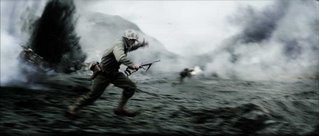 His latest comes on the heels of his second Oscar win for Best Director for the beautifully paced and detailed “Million Dollar Baby”. Now, Mr. Eastwood has decided to cast his lens on the deadly battle for the small chunk of island real estate known as Iwo Jima at the height of the Pacific Theatre operations of World War II. As many of you know, or not, Clint has opted to tell the tale from both the American and Japanese perspectives through two full length films.
His latest comes on the heels of his second Oscar win for Best Director for the beautifully paced and detailed “Million Dollar Baby”. Now, Mr. Eastwood has decided to cast his lens on the deadly battle for the small chunk of island real estate known as Iwo Jima at the height of the Pacific Theatre operations of World War II. As many of you know, or not, Clint has opted to tell the tale from both the American and Japanese perspectives through two full length films.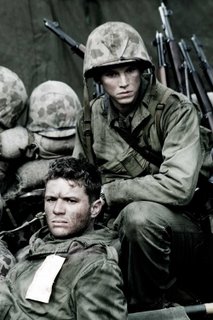 The first being the very fine “Flags of Our Fathers”. When we first heard of Clint’s plan, we figured the G.I. Joe version would be a rah-rah-flag-waving tribute a la Stephen Spielberg’s “Saving Private Ryan”. Silly us. We should have realized that the man whose claim to fame came riding horseback through countless Spaghetti Westerns and would later turn that proud mythology on its ear with his visually literate and profound examination of the cost of violence with “Unforgiven”, would have a word or two to say about the complexity of war.
The first being the very fine “Flags of Our Fathers”. When we first heard of Clint’s plan, we figured the G.I. Joe version would be a rah-rah-flag-waving tribute a la Stephen Spielberg’s “Saving Private Ryan”. Silly us. We should have realized that the man whose claim to fame came riding horseback through countless Spaghetti Westerns and would later turn that proud mythology on its ear with his visually literate and profound examination of the cost of violence with “Unforgiven”, would have a word or two to say about the complexity of war.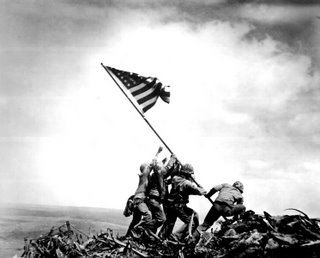 “Flags of Our Fathers” is no call to patriot’s glory. Rather, by examining the lives of three of the soldiers associated with the famed photo immortalizing the flag raising on Iwo Jima, he has found a fine tale to weave about the cost of heroism, the need for symbols in times of war and the “pity of war” itself.
“Flags of Our Fathers” is no call to patriot’s glory. Rather, by examining the lives of three of the soldiers associated with the famed photo immortalizing the flag raising on Iwo Jima, he has found a fine tale to weave about the cost of heroism, the need for symbols in times of war and the “pity of war” itself. The film features no big name stars, but a handsome parcel of classy second stringers and very ripe young stable of hunks. Our future husbands Paul Walker and Jamie Bell lead the troop of studlets facing their final fate on Iwo Jima, ably supported by such talented youngsters as Joseph Cross, Benjamin Walker and Stark Sands. Stage and screen vets George Grizzard, Harve Presnell, George Hearn and Len Cariou supply the more than necessary aged charm and talent as the elder surviving versions of the young soldiers. And as the various senior officers in charge of the melee, Robert Patrick, Neal McDonough and Barry Pepper fulfill their end of the bargain notably.
The film features no big name stars, but a handsome parcel of classy second stringers and very ripe young stable of hunks. Our future husbands Paul Walker and Jamie Bell lead the troop of studlets facing their final fate on Iwo Jima, ably supported by such talented youngsters as Joseph Cross, Benjamin Walker and Stark Sands. Stage and screen vets George Grizzard, Harve Presnell, George Hearn and Len Cariou supply the more than necessary aged charm and talent as the elder surviving versions of the young soldiers. And as the various senior officers in charge of the melee, Robert Patrick, Neal McDonough and Barry Pepper fulfill their end of the bargain notably.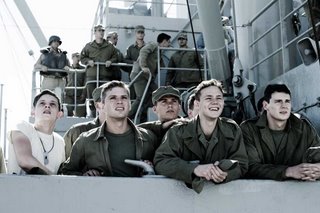 While there is precious little estrogen amidst this sea of gabardine trousers, two time Tony Award winning actress Judith Ivey scores a bull’s-eye as one particularly bereft mother who must confront her worst fears while becoming relegated to the curb by a military blunder that kicks off the proceedings.
While there is precious little estrogen amidst this sea of gabardine trousers, two time Tony Award winning actress Judith Ivey scores a bull’s-eye as one particularly bereft mother who must confront her worst fears while becoming relegated to the curb by a military blunder that kicks off the proceedings.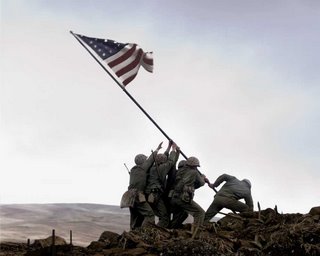 For you see kids, the famed image of the flag waving proudly over Iwo Jima was a staged photo op that echoed the real flag raising held hours earlier. While the military brass decided that the symbolism was important enough to capture on film and rush back to the states as a testament to the U.S.’s military power – they could hardly be troubled to take careful note as to which solider in particular had been involved. Until it was too late to honor them.
For you see kids, the famed image of the flag waving proudly over Iwo Jima was a staged photo op that echoed the real flag raising held hours earlier. While the military brass decided that the symbolism was important enough to capture on film and rush back to the states as a testament to the U.S.’s military power – they could hardly be troubled to take careful note as to which solider in particular had been involved. Until it was too late to honor them.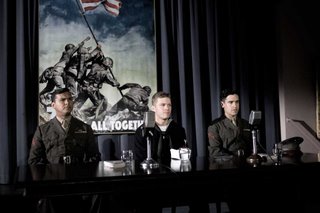 And so begins the tale of three soldiers literally hand picked to represent the best and brightest of the lot and history be damned if they weren’t exactly the soldiers in question. Ryan Phillippe, Jesse Bradford and Adam Beach are our guides through this surprisingly emotional and delightfully layered tale.
And so begins the tale of three soldiers literally hand picked to represent the best and brightest of the lot and history be damned if they weren’t exactly the soldiers in question. Ryan Phillippe, Jesse Bradford and Adam Beach are our guides through this surprisingly emotional and delightfully layered tale.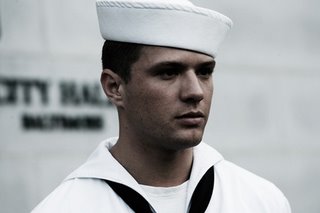 Ryan Phillippe is the ostensible lead as one John “Doc” Bradley, a corpsman whose haunted memory of the sacrifices made on the sulfur ridden isthmus of Iwo Jima continues to haunt him well into old age. For, like “Saving Private Ryan” – “Flags of Our Fathers” is told through flashback, incorporating some fine elder character actors from stage and screen to portray the surviving vets who downplay their contribution to history. Ryan Phillippe surprised us with his very fine turn as the humblest and strongest of the lot. As a corpsman, he is forced to deal with the death of his buddies on the battlefields in minute detail. We understand the strength of the man who must deal with this brutal reality and we loved the way Phillippe underplayed what could have easily been a cartoon leading man role.
Ryan Phillippe is the ostensible lead as one John “Doc” Bradley, a corpsman whose haunted memory of the sacrifices made on the sulfur ridden isthmus of Iwo Jima continues to haunt him well into old age. For, like “Saving Private Ryan” – “Flags of Our Fathers” is told through flashback, incorporating some fine elder character actors from stage and screen to portray the surviving vets who downplay their contribution to history. Ryan Phillippe surprised us with his very fine turn as the humblest and strongest of the lot. As a corpsman, he is forced to deal with the death of his buddies on the battlefields in minute detail. We understand the strength of the man who must deal with this brutal reality and we loved the way Phillippe underplayed what could have easily been a cartoon leading man role. Adam Beach portrays Ira Hayes, the famed Native American whose contribution to the historical image from Iwo Jima simultaneously raises the level of recognition of his beleaguered people and dooms him to a celebrity status he is not able to enjoy due to the blatant racism of his time. His rapid decline in stability and his descent into poverty and misery at the tip of a bottle is handled well enough by young Mr. Beach – but sadly his emotional range is a bit lacking in some of the more demanding scenes. He can play a drunk well enough; it’s just that he seems to be “playing” it. Fortunately for the audience, the direction is so fine that Clint never permits him to sink too low as an actor and his performance is ultimately successful in the much larger scope of the film. (Sidenote: Are there any other Native American actors out there? For hasn’t Mr. Beach trod the WWII token “Injun” path already? Go figure.)
Adam Beach portrays Ira Hayes, the famed Native American whose contribution to the historical image from Iwo Jima simultaneously raises the level of recognition of his beleaguered people and dooms him to a celebrity status he is not able to enjoy due to the blatant racism of his time. His rapid decline in stability and his descent into poverty and misery at the tip of a bottle is handled well enough by young Mr. Beach – but sadly his emotional range is a bit lacking in some of the more demanding scenes. He can play a drunk well enough; it’s just that he seems to be “playing” it. Fortunately for the audience, the direction is so fine that Clint never permits him to sink too low as an actor and his performance is ultimately successful in the much larger scope of the film. (Sidenote: Are there any other Native American actors out there? For hasn’t Mr. Beach trod the WWII token “Injun” path already? Go figure.)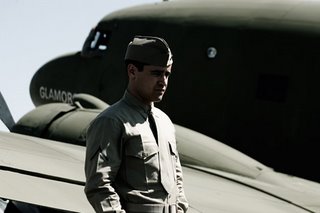 That adorable little piece of ass, Jesse Bradford who developed a cult following after his memorable adolescent turn in Steven Soderbergh’s “King of the Hill” and solidified his teen heartthrob status with the “Citizen Kane” of cheerleader movies, “Bring It On” is ideally cast as the solider most comfortable with the encroaching hero worship. As Rene Gagnon, Bradford struts through every social setting with a sang froid that he found unattainable on the battlefield.
That adorable little piece of ass, Jesse Bradford who developed a cult following after his memorable adolescent turn in Steven Soderbergh’s “King of the Hill” and solidified his teen heartthrob status with the “Citizen Kane” of cheerleader movies, “Bring It On” is ideally cast as the solider most comfortable with the encroaching hero worship. As Rene Gagnon, Bradford struts through every social setting with a sang froid that he found unattainable on the battlefield.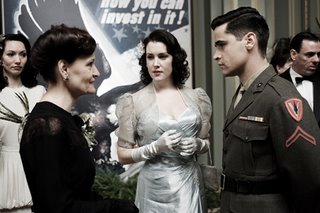 In this, he is ably supported by our old chum Melanie Lynskey – Kate Winslet’s sparring partner in Peter Jackson’s deliciously wrought “Heavenly Creatures”. She portrays his back-home-sweetheart Pauline whose reinvigorated attraction to her once forgotten beau is suspiciously and hilariously brought forth amidst the flash of photographs and the promise of riches and fame.
In this, he is ably supported by our old chum Melanie Lynskey – Kate Winslet’s sparring partner in Peter Jackson’s deliciously wrought “Heavenly Creatures”. She portrays his back-home-sweetheart Pauline whose reinvigorated attraction to her once forgotten beau is suspiciously and hilariously brought forth amidst the flash of photographs and the promise of riches and fame. This is what “Flags of Our Fathers” is quite unexpectedly about – the cult of hero worship and the necessity for symbols during a time of war. We found it fascinating how Clint was able to dramatize the symbolic gestures and fragments of history that become a sort of shorthand for a far more complicated panorama. Would the Allies have defeated the Japanese, if it were not for the famed image of several brave soldiers hoisting “Ole Glory” aloft in a field of battle? Probably. Would the motivation, the desire and more importantly the money have been any less forthcoming if the American public thought they were fighting a losing battle? Hmmm?
This is what “Flags of Our Fathers” is quite unexpectedly about – the cult of hero worship and the necessity for symbols during a time of war. We found it fascinating how Clint was able to dramatize the symbolic gestures and fragments of history that become a sort of shorthand for a far more complicated panorama. Would the Allies have defeated the Japanese, if it were not for the famed image of several brave soldiers hoisting “Ole Glory” aloft in a field of battle? Probably. Would the motivation, the desire and more importantly the money have been any less forthcoming if the American public thought they were fighting a losing battle? Hmmm?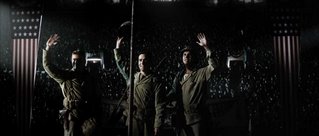 Well, we will never know. For that particular history has already been written. Thankfully, for movie audiences, Clint Eastwood delivers a no nonsense tale of ordinary men and women facing the challenges of their life with a straight forward approach to be envied by lesser directors. He is able to handle the various storylines, the flashback framing device and maintain a respectable view of the real life heroes who were lost amidst the fanfare of publicity. A very satisfying war “epic” if you will that dares to focus on the intimate. Good for you, Clint, good for you. Bless you all!
Well, we will never know. For that particular history has already been written. Thankfully, for movie audiences, Clint Eastwood delivers a no nonsense tale of ordinary men and women facing the challenges of their life with a straight forward approach to be envied by lesser directors. He is able to handle the various storylines, the flashback framing device and maintain a respectable view of the real life heroes who were lost amidst the fanfare of publicity. A very satisfying war “epic” if you will that dares to focus on the intimate. Good for you, Clint, good for you. Bless you all!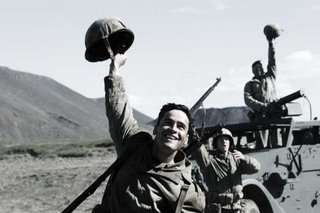 Directed by Clint Eastwood
Directed by Clint Eastwood
Written by William Broyles Jr. and Paul Haggis
Based on the book by James Bradley & Ron Powers
Starring
Ryan Phillippe as John “Doc” Bradley
Jesse Bradford as Rene Gagnon
Adam Beach as Ira Hayes
John Benjamin Hickey as Keyes Beech
John Slattery as Bud Gerber
Barry Pepper as Mike Strank
Jamie Bell as Ralph “Iggy” Ignatowski
Paul Walker as Hank Hansen
Robert Patrick as Colonel Chandler Johnson
Neal McDonough as Captain Severance
Melanie Lynskey as Pauline Harnois
Thomas McCarthy as James Bradley
Chris Bauer as Commandant Vandergrift
Judith Ivey as Belle Block
Joseph Cross as Franklin Sousley
Benjamin Walker as Harlon Block
Alessandro Mastrobuono as Lindberg
Scott Reeves as Lundsford
Stark Sands as Gust
George Grizzard as John Bradley
Harve Presnell as Dave Severance
George Hearn as Walter Gust
Len Cariou as Mr. Beech
David Patrick Kelly as President Harry S. Truman
Gordon Clapp as General “Howlin’ Mad” Smith
Cinematography by Tom Stern
Film Editing by Joel Cox
Original Music by Clint Eastwood
Production Design by Henry Bumstead
Art Direction by Jack G. Taylor Jr.
Set Decoration by Richard C. Goddard
Costume Design by Deborah Hopper
Labels: Movie Review


0 Comments:
Post a Comment
<< Home